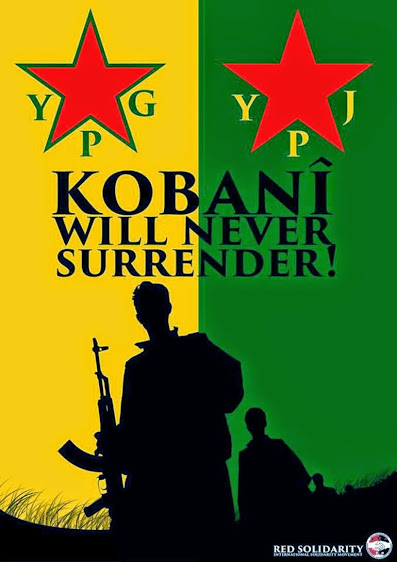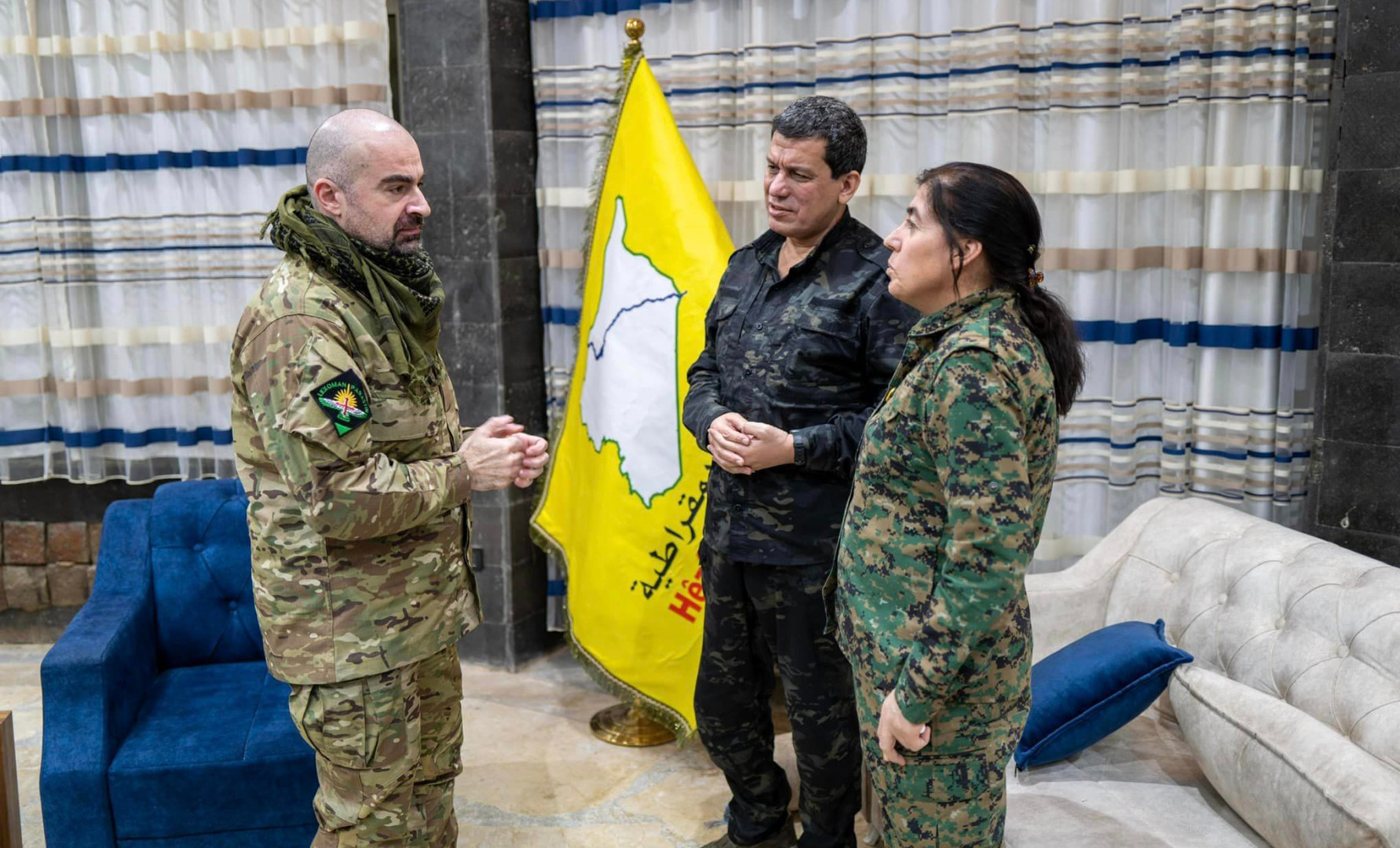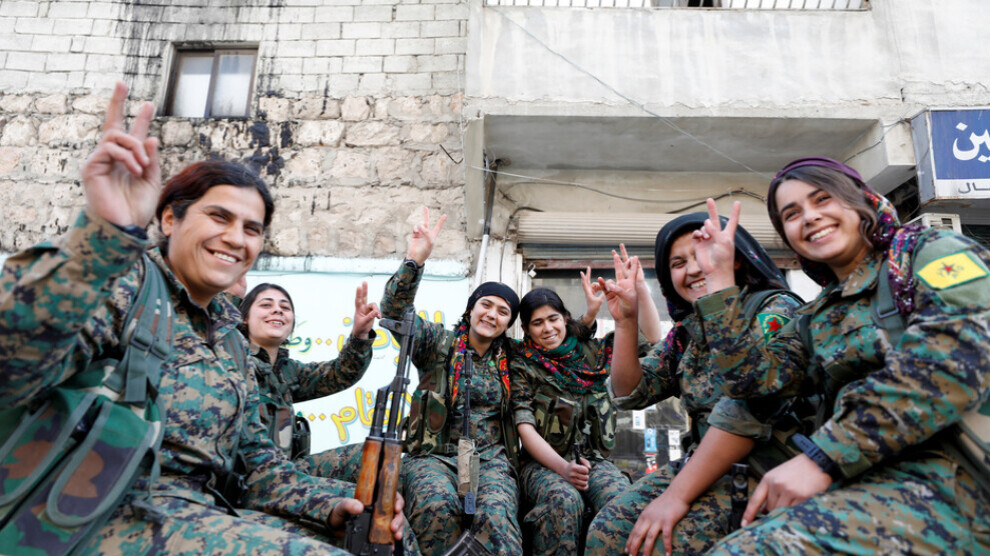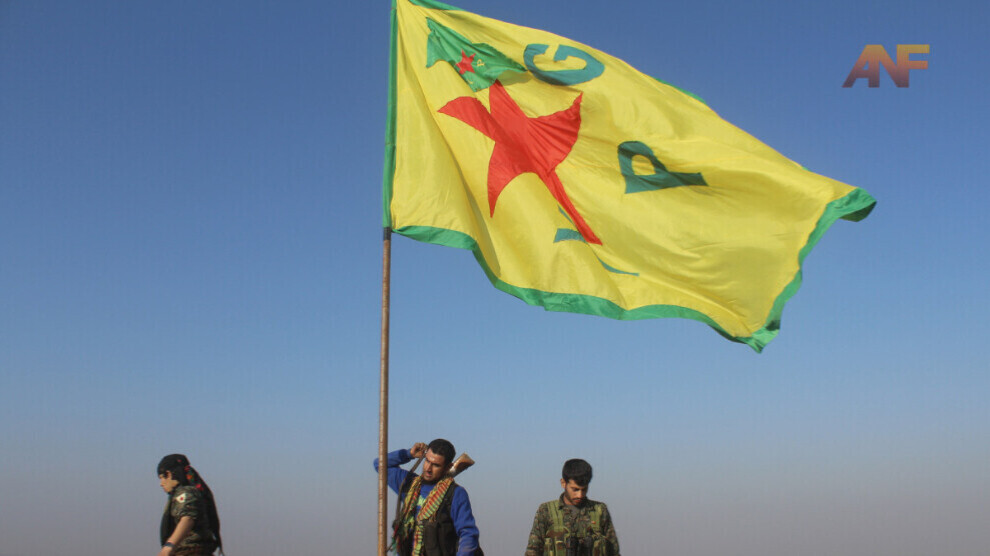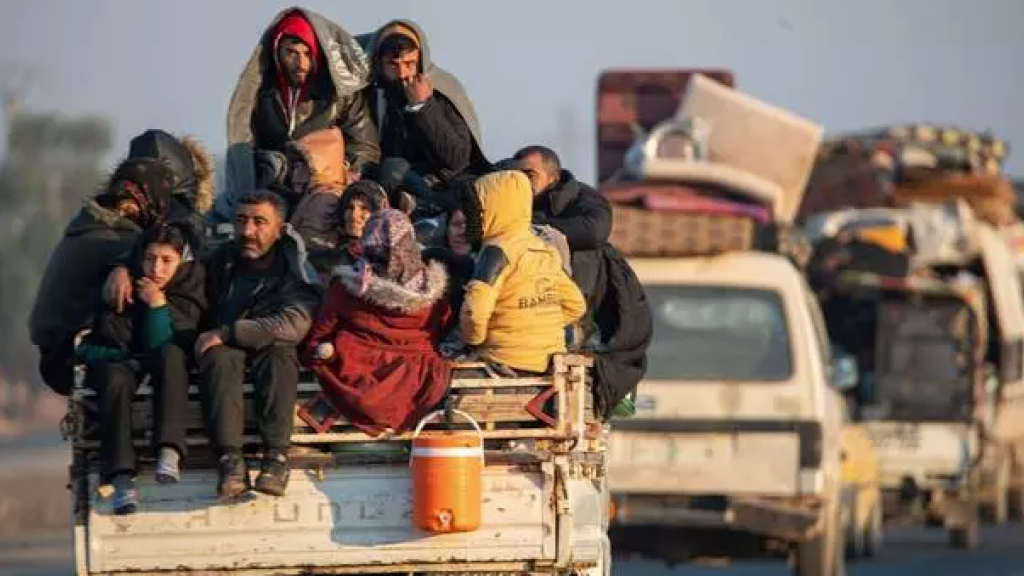SYRIAN-KURDISTAN:
‘We cannot hand over our weapons while attacks on women and our territories continue’ — An interview with YPJ Commander-in-Chief Rohilat Afrin
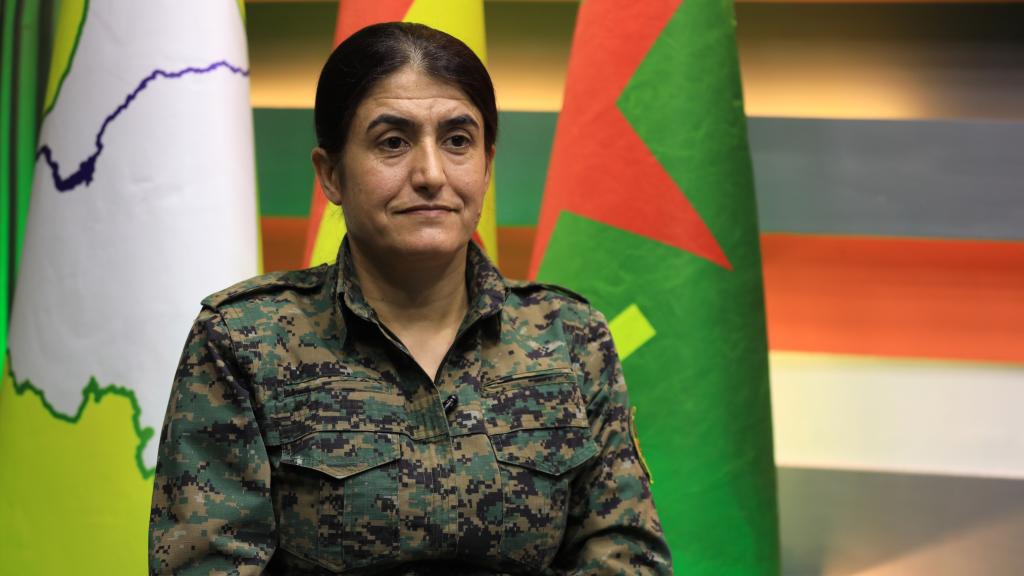
First published at Rojava Information Center.
As all eyes were on the Hayʼat Tahrir al-Sham (HTS)-led forces sweeping across Syria with Assad crumbling, the Turkish-backed Syrian National Army (SNA) launched an attack on North and East Syria (NES), seizing Shehba and Manbij from the Syrian Democratic Forces (SDF). Now, Turkey is threatening an invasion into the Kurdish city of Kobane. The SNA meanwhile, is attempting to cross the Euphrates River and further encroach into NES, with fierce clashes underway in the Manbij countryside. The all-female YPJ units – that shot to prominence during their fight against ISIS in Kobane in 2014 — are on the frontlines as part of the SDF.
YPJ Commander-in-Chief, Rohilat Afrin, talked to RIC about the state of the war in Manbij, the ceasefire that never was, the possibility of a Turkish invasion in Kobane, HTS-SDF relations and the potential for the YPJ to be integrated into the Syrian army.
The current situation on the frontlines seems to have been more or less unchanging in recent days. Can you shortly explain the state of the fighting?
It is evident that there is a war being waged against our region — this is in the context of the ongoing fighting here, particularly at the Tishreen Dam and Qereqozak Bridge. This situation of war has been a constant since the collapse of the Baath regime and subsequent rise of the al-Jolani government. Turkey and the Turkish-backed SNA have sought to exploit a power vacuum and initiate an attack on our region. This is in staunch opposition to our achievements here. These attacks are not simply military actions — they are a deliberate attempt to destroy what we have built up here. Turkey and its mercenaries are pursuing a policy of destruction and subjugation through these attacks.
Tishreen and Qereqozak are the two main gateways to enter NES. They are strategically important to protect Kobane, Tabqa, Raqqa and the rest of NES in general. Targeting these gateways is connected to Turkey’s aim of targeting our achievements in the region. In our region, people have been brought together. A collective mentality has united its populace. Years of work have been invested in building this mentality amongst people. They are determined to wipe it out. This war aims to dismantle the values established in this region.
Our fighters are currently engaged in combat with the SNA, fighting strongly. What people really should notice is that Turkey has been using drones and warplanes unceasingly, encouraging the SNA to attack. Our fighters’ resilience has not been deterred. If it wasn’t for Turkey’s aerial power, the SNA would be easily defeated. Actually, the number of fatalities and injuries within their ranks is already high. They have withdrawn from certain points. In these circumstances, a major confrontation is underway.
Supposedly, a ceasefire was called in Manbij some weeks ago. Everyday there is fighting however – so was there never any ceasefire?
We cannot call it a ceasefire. In talk there was a ceasefire. In practice we witnessed nothing like this. When the ceasefire was announced in Manbij it was on the basis that we evacuate people wishing to flee, the bodies of our fallen fighters and our wounded who were in their hands. However no such ceasefire materialized due to the attacks the SNA launched. The ceasefire was nothing on the ground. It was just talk.
Then, as the YPJ, YPG and SDF, we wanted to move forwards from the Tishreen Dam and Qereqozak, to advance a bit, because we were under heavy fire. There were a lot of attacks both on the Tishreen and from the Deir Hafir axis. So we took back some villages. This was because we wanted to protect the Dam and the Bridge. With this as our situation, a ceasefire cannot be spoken of.
The SNA were drunk from success in Syria, as they participated in the advance from Idlib to Damascus. City after city was falling. They thought it would be the same with Qereqozak Bridge and the Tishreen Dam. Now they are both psychologically and materially facing losses having been confronted with the resistance of our fighters. On both fronts, our fighters have been steadfast.
And what is the current threat to Kobane?
What I said before connects to the issue of Kobane. There are a lot of threats against Kobane. As a city, Kobane does not just concern NES. It is the world’s city, as expressed by the establishment of ‘World Kobane Day’ in solidarity. The struggle that took place in Kobane saw a force like ISIS defeated. It has been around 10 years since this massive victory. At the time, Erdogan was observing the situation day after day, saying ‘Kobane will fall today’ or ‘Kobane will fall tomorrow’. But Kobane was liberated, through will, resistance and determination. Through this, Kobane became globally famous.
The danger Kobane is facing is serious. When we say this, it means that there is a danger to the whole of NES. Turkey sees that Kobane was a reason behind what has been achieved in NES. Turkey wants to spread its influence in Syria. In this context it threatens the city and wants to occupy it. Actually the danger posed to Kobane never ended. There have always been threats. These threats in turn were met by responses of solidarity — politicians, human rights activists and the global public, even the Coalition, made statements opposing war against the city.
If Turkey were to take over the Tishreen Dam and Qereqozak bridge, Tabqa, Raqqa, Kobane, and all regions of NES would be threatened. The politics — war and victory — in Kobane concern the whole world, not just NES. We are confident that Kobane will receive external support and solidarity. We will be able to protect it. But Turkey is determined to realize its goals. Against this stands the SDF and YPJ. The fight they waged in Kobane [in 2014] shocked the world. In the current period, we will show the same stance against Turkey and the SNA.
How do you see the diplomatic flurry around Damascus, with many delegations coming to meet al-Jolani, including from Turkey?
Many states have been seeking to establish relations with HTS now al-Jolani’s new government has emerged. Turkish officials have also come to Damascus, such as Hakan Fidan. He demonstrates a certain mentality — in which the primary aim is to wipe out the Autonomous Administration. Turkey wants to organize Syria as its own province; to control it, to have influence on Syria. Hakan Fidan’s arrival in Damascus made this clear. He wants to influence HTS.
Are the Americans still in Kobane? And if Turkey attacks Kobane do you expect American assistance?
Throughout the last phase until the latest developments began, the Russians were present in Manbij, Ayn Issa and Kobane. The Americans were not present there. With the recent withdrawal of the Russians, American patrols started to take place, but there are no bases there. Through these patrols, America was saying ‘we are here, we will help protect the city’, sending a message that they are present. Our cooperation with the Coalition began with the fight against ISIS. If the US-led Coalition don’t fulfil their role, they will face accusations of double-standards. If Turkey attacks Kobane, do we expect that the US will help? Materially, no. But in general, with the support they exhibit and through them meeting with Turkey, they have shown that their position is that the issue must be peacefully resolved.
Even if they are purely following their own interests, it has prevented the doors to a Turkish invasion into Kobane from being opened. It is evident from certain things within their diplomatic efforts that they have attempted to help us. However, we see that the Coalition has a responsibility to put a halt to the current fighting and aerial attacks. So in general, we do not expect that there will be any type of concrete blocking of a ground invasion, but in the diplomatic context there are efforts to prevent this, even if they are not enough.
What about international assistance more generally, aside from America? The last time Kobane saw war was in 2014 when ISIS attacked. At that time, the international solidarity was significant. This time the threat is from Turkey rather than ISIS. Do you expect similar global support?
During ISIS’ siege on Kobane, the actions of YPJ as a women’s force resonated globally. Through Kobane — and with the July 19 Revolution here — silent and defenceless women found their voice, their strength and came to the forefront as leaders. The attitude of the YPJ in 2014 made them an example to follow in the world. We have learned from all the experiences and challenges we have gone through for years, in terms of strengthening tactics and methods. We have confidence that the YPJ — and YPG and SDF — will be able to stand strong against whatever may come. As women’s units, we have faith in this. We were victorious in Kobane. This also demonstrated to women worldwide that a women’s army is a necessity to protect women. Through this protection, we are able to organize ourselves. Fighting to protect our territories has continued like this. As I already stated, we believe that the war in Kobane was a war for humanity; a war to protect all women and land. We are confident that a state of public alert on a global scale will be raised and solidarity will be provided should Kobane be attacked again.
There are some now saying the SDF should surrender its weapons to a central Syrian army and integrate. What does this mean for the YPJ?
The new government’s intention — I am not speaking of the general populace, but specifically the government — to do this is shown through the content of its approach towards the SDF. They want a centralized state based on the unification of the army, institutions and also mentality. What they circulate to the press and media as well as the interviews they make, suggests that the SDF will not be accepted in its current form and as it is.
We are under attack. This makes it impossible for us to lay down our arms. The SDF is a force with ten years of experience fighting ISIS. At the international level, it is supported by the Coalition.
Turkey refuses to accept the Autonomous Administration as a model and idea. Turkey also does not accept the SDF as an army. It is imposing this on the new government. This also means the YPJ is not accepted — the YPJ, which fought against ISIS, achieved significant gains, and is at the core of the Autonomous Administration.
With the incoming government, women will have to heighten their struggle in order to defend themselves. We cannot hand over our weapons while attacks on us and our territories continue. Such a thing can only occur through agreements and talks that formalize a democratic Syria in which the rights of all women, nationalities and peoples are guaranteed and realized. If these conditions are met, then we can discuss the issue of weapons.
The mindset entrenched within the new government makes it clear that there is no place for women there — or only a place where women must accept to cover their heads and adopt a patriarchal mindset. Avoiding the above will require a great deal of organization and struggle. This is a serious danger that we need to recognize. The new government’s standards for women are a threat to the existence, role and culture of women.
On a global level, we have women forming an army, protecting themselves and fighting, for the first time. This independent, armed force has inspired many women — Arab, Kurd, Assyrian and international.
Would the YPJ accept being part of the Syrian army?
As this juncture, it remains unclear what the eventual outcome of the situation will be. There are a multitude of factors that are as of yet unclear. The situation is complex. The new government is in serious chaos, both in terms of its institutions and its ability to govern the entire country. The future remains uncertain. If — as the population wishes for and as we wish for — Syria truly becomes a democratic Syria, politically, socially, legally; if all the effort given and achievements gained in NES through the past 12 years are recognized, then of course YPJ can become a part of this army [the Syrian army]. In fact, YPJ can serve as a model for Syrian women, setting an example of women’s autonomy and self-defence. However, as previously stated, the precise nature of the situation remains uncertain. It is imperative to comprehend that the scope of this matter is wide. Our objectives, positions and approach will be formulated on this foundation I have explained. Not following the current way of thinking exhibited by HTS — that everything must be centralized. If an approach is adopted that embraces diversity and is democratic, then the role of YPJ can be discussed. The composition of a Syrian women’s army can be shaped by the YPJ. This is what I can say at this point.

